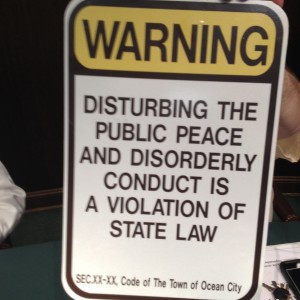
OCEAN CITY — With Bike Week in the books and a handful of vehicle-related special events yet to come, Ocean City officials this week passed an ordinance requiring businesses to install signs warning revelers of the existing disturbing the peace and disorderly conduct laws.
Earlier this month, the Mayor and Council backed off a pair of rather draconian ordinances aimed at curbing some of the disruption associated with the offseason vehicle-related special events and opted instead to enforce disorderly conduct and disturbing the peace laws already on the books. Ever since the spring Cruisin’ event, with its big traffic jams, crowds of often disruptive and unruly onlookers lining the streets and cramming into business parking lots, for example, Ocean City officials have wrestled with ideas on how to continue to foster a welcoming attitude while toning down some of the illicit behavior associated with the events.
Borne out of those discussions was a pair of proposed ordinances which, if approved, would put a damper on the special events-related activities. One of the proposed ordinances would have expanded the Ocean City Police Department’s ability to enforce open container and public consumption laws on certain private property including the parking lots of shopping centers, hotels and motels and restaurants, for example. One of the major issues with some of the vehicle-related special events are the crowds of spectators that congregate with coolers in private parking lots, some merely enjoying the parade of vehicles and others egging on illicit behavior from the drivers.
A second proposed ordinance outlined the destruction of landscaped areas in private parking lots along the highway and would have held accountable those who caused the damage as well as the property owners for failing to prevent or deter the activity. In fact, both of the proposed ordinances would have had an element of enforcement and accountability for the business owners.
However, two weeks ago, the Mayor and Council shelved those ordinances, reversed course and opted instead to focus on enforcing the state laws regarding disorderly conduct and disturbing the peace already on the books. Instead, town officials proposed an ordinance requiring businesses that front the major arteries in the resort, including Coastal Highway, Philadelphia Avenue and Baltimore Avenue, for example, to install signs warning residents and visitors there were state laws against disorderly conduct and disturbing the peace and that the laws would be strictly enforced.
The conventional thinking is the signs would make it known to attendees in no uncertain terms the existing laws will be strictly enforced and ease the enforcement efforts by the OCPD and the allied law enforcement agencies that support during the large special events. It remains to be seen if the signs alone will achieve the desired goal, but the council voted unanimously on Monday to approve them.
The town will produce and distribute the signs, a model of which reads, “Warning-Disturbing the public peace and disorderly conduct is a violation of state law,” and the private businesses will install them. Business owners will have until May 1, 2016 to have the signs installed, although many are requesting them already and will likely have them installed soon.
“We will make the signs and distribute them,” said Mayor and Acting City Manager Rick Meehan. “We’ve had a number of business owners requesting them already. They want these signs and we encourage them to get them up. While the ordinance won’t go into effect until May 1, time is of the essence and we’re encouraging businesses to get them installed as soon as they become available.”
Responding to a question from the audience about the cost of the signs on the city’s dime, Meehan said signs will cost a little over $7 each to produce. With the number of businesses required to install them, Meehan estimated the total cost at around $5,000.
“We’re investing around $5,000 to help our law enforcement prevent problems and keep the peace and that’s a small price to pay,” he said. “We’re hoping this is going to provide some relief for our residents and there is a cost associated with doing anything.”
At first, the business community rejected, or at least resisted, the originally proposed ordinances for several reasons, not the least of which was they appeared to shift the onus on the private sector to monitor and police the disruptive behavior. More importantly, the business community voiced concern cracking down on special events with stricter laws and enforcement might drive away the vehicle-related special events that put heads in beds and backsides in restaurant seats. Putting up the signs and enforcing the existing laws appears on the surface to be a compromise of sorts.
“It’s part of the process,” said Meehan. “Our goal was to get people’s attention and engage them in the debate. This is better than what was originally proposed. It’s better for our community and it’s the result of getting together and formulating ideas and good government.”
Councilman Wayne Hartman rejected any notion the council caved on the stronger proposed ordinances.
“This isn’t changing our minds,” he said. “This is just another tool we can use that already existed.”

